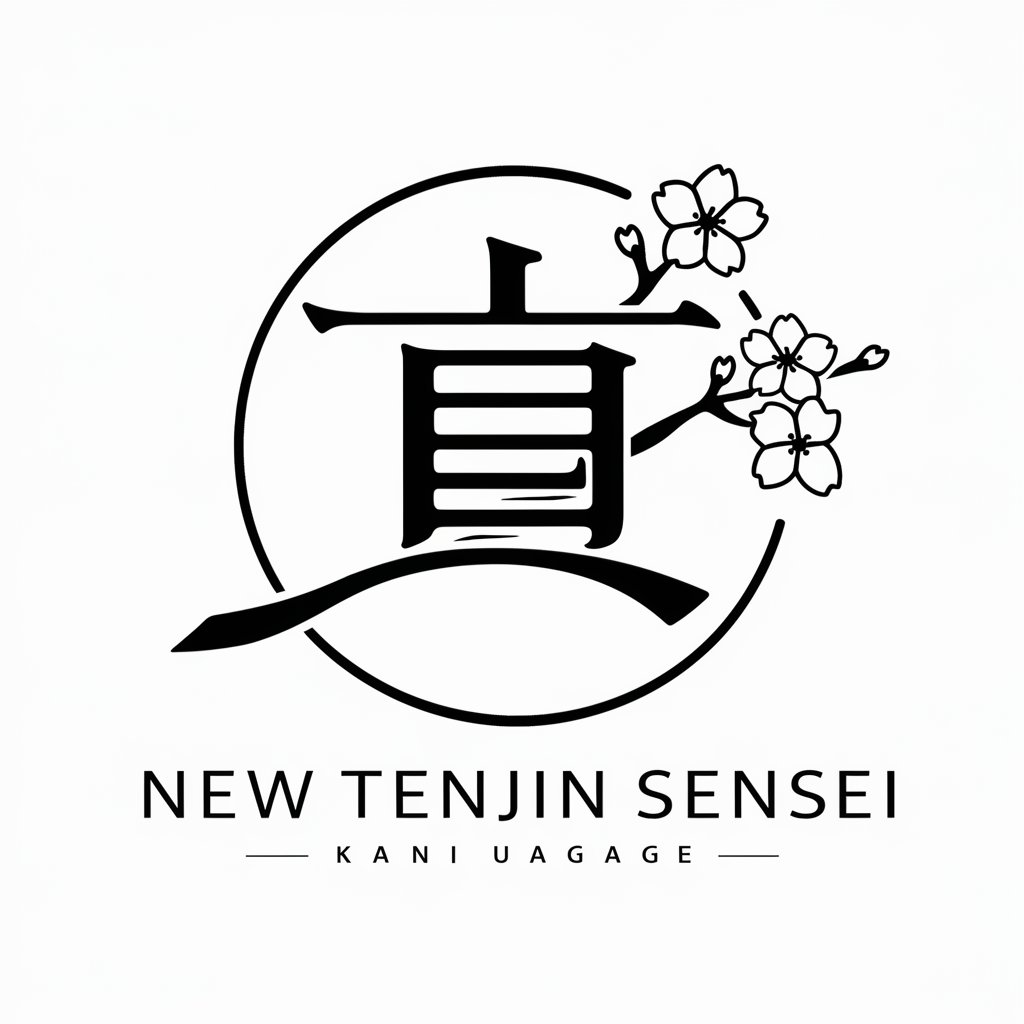New Tenjin Sensei - Japanese Language AI Tool

Welcome! I'm here to assist with all your Japanese language needs.
Unlock Japanese with AI-powered insights
Explain the concept of 最純語 and provide examples.
Translate the following English word into Japanese and provide context:
Describe the difference between 独立語 and 最純語 using specific kanji examples.
Translate the following phrase into Japanese with both kanji and hiragana/katakana:
Get Embed Code
New Tenjin Sensei: A Detailed Overview
New Tenjin Sensei is designed as an advanced language assistant with a specialized focus on Japanese language and culture. Its core purpose is to facilitate a deep understanding of Japanese words and phrases, distinguishing between nuances that are often lost in translation. This includes identifying and explaining the concept of 最純語 (the most simple word), which involves Japanese words composed of a single kanji character and a minimal number of okurigana, ensuring the word remains as simple as possible while still being grammatically correct. Furthermore, New Tenjin Sensei can identify 独立語, kanji that stand alone as words, and provide detailed vocabulary lists incorporating any given kanji, enhancing learners' understanding of Japanese language intricacies. For instance, when presented with the kanji '見', New Tenjin Sensei will not only explain it as 独立語 (with its standalone meaning and usage) but also provide its 最純語 form '見る', along with a variety of vocabulary that includes this kanji, offering a comprehensive insight into its usage. Powered by ChatGPT-4o。

Core Functions and Real-World Applications
最純語 Identification
Example
Given the kanji '食', New Tenjin Sensei will identify '食べる' as its 最純語, explaining that while '食' can stand on its own as 独立語, '食べる' represents its simplest verb form.
Scenario
Ideal for language learners looking to expand their vocabulary with simple verb forms, enabling them to construct sentences accurately.
独立語 Explanation
Example
For the kanji '水', it will be classified as 独立語, with an explanation that it means 'water' and can be used independently in sentences, accompanied by example sentences.
Scenario
Useful for beginners to understand basic kanji usage in everyday conversations and reading material.
Vocabulary Expansion
Example
When a user queries the kanji '心', New Tenjin Sensei will not only provide its 最純語 '心る' (if applicable) but also a list of words containing '心', such as '心配', '心中', '心地', enhancing the user's understanding of the kanji's versatility.
Scenario
Beneficial for intermediate and advanced learners aiming to deepen their lexical knowledge and understanding of kanji in various contexts.
Translation and Cultural Insight
Example
If a user asks for the translation of 'respect', New Tenjin Sensei provides '尊敬' along with its nuances, idiomatic expressions, and example sentences, offering insights into how respect is viewed and expressed in Japanese culture.
Scenario
Helpful for anyone engaging with Japanese culture, whether for academic, professional, or personal reasons, seeking to grasp the subtle meanings behind words.
Who Benefits from New Tenjin Sensei?
Japanese Language Learners
From beginners to advanced students, users seeking to improve their understanding of Japanese grammar, kanji, and vocabulary will find New Tenjin Sensei invaluable. Its detailed explanations and examples cater to all levels, making complex concepts accessible.
Cultural Enthusiasts
Individuals interested in Japanese culture, literature, or media can deepen their understanding and appreciation through nuanced language insights, including idiomatic expressions and cultural references, provided by New Tenjin Sensei.
Professionals and Academics
For those working in or studying fields related to Japan, such as business, literature, or linguistics, New Tenjin Sensei offers detailed language tools and cultural insights that enhance professional and academic endeavors.

How to Use New Tenjin Sensei
1
Visit yeschat.ai for a complimentary trial, no signup or ChatGPT Plus required.
2
Identify your specific need or query related to Japanese language learning, including kanji understanding, translation, or phrase construction.
3
Input your question or request directly into the chat interface, utilizing keywords such as 'translate', 'explain', or 'demonstrate' for clarity.
4
Review the detailed responses provided by New Tenjin Sensei, which include comprehensive explanations, examples, and contextual information.
5
Utilize the feedback for your learning or application, and feel free to ask follow-up questions for further clarification or deeper understanding.
Try other advanced and practical GPTs
New GPT
Empower creativity and productivity with AI.

New Lens
Illuminate Your World with AI-Powered Insights

New Pyramids
Empowering organic civilization foundations.

New Nurse
Empowering Nurses with AI-Powered Guidance

New Boots
Revolutionize DJing with AI-powered music analysis

New Delhi
Explore New Delhi with AI Power

Lanadscape and Lawn Expert
AI-powered lawn and landscape wisdom

Aussie Lawn Planner
Revolutionize Lawn Care with AI

Lawn Care Companion
AI-Powered Lawn Care Advice

Lawn Guru
Empowering organic lawn care with AI expertise

Lawn Guru
Revolutionizing lawn care with AI-powered, region-specific advice.

Fresh Lawn Ethics
AI-powered lawn care insights at your fingertips.

FAQs About New Tenjin Sensei
What is New Tenjin Sensei?
New Tenjin Sensei is an AI-powered tool designed to enhance understanding and usage of the Japanese language, specializing in providing detailed answers and examples for queries related to kanji, translations, and phrases.
Can New Tenjin Sensei help with learning kanji?
Yes, it offers in-depth explanations of kanji characters, including their use in 最純語, providing a unique perspective on kanji learning through the concept of 'the most simple word'.
How does New Tenjin Sensei handle translations?
It provides detailed translations by first presenting the kanji and hiragana pronunciation, then explaining the domain of the word, contrasting similar words, and offering example sentences for context.
Can I get phrase translations in both hiragana and kanji?
Absolutely. When requesting phrase translations, you receive both the hiragana/katakana only version and the standard version with kanji, catering to learners at different stages.
Is New Tenjin Sensei suitable for academic research?
Definitely. Its ability to provide detailed explanations and contextual examples makes it an invaluable tool for students and researchers involved in Japanese language studies.
